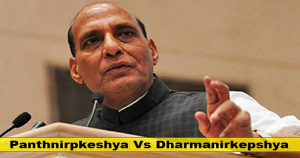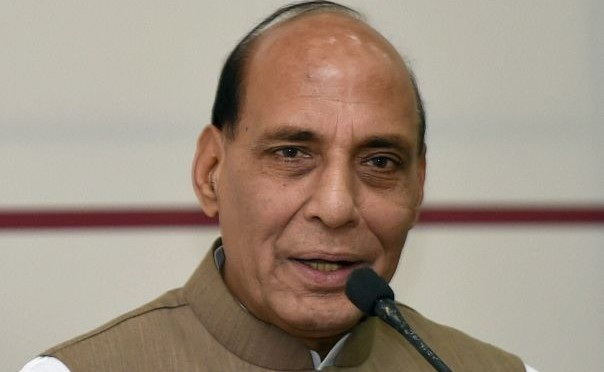
Panthnirpkeshya Vs Dharmanirkepshya, Is Rajnath Singh Giving A New Twist To The ‘Secular’ Debate?
Union Home Minister Rajnath Singh argued with the opposition Congress today over the word “secularism” during a special discussion in Parliament on the Constitution as the winter session began.

Rajnath Singh objected to the use of Hindi word ‘DharmaNirpekshta’, saying the literal translation of the secularism should be ‘Panth Nirpekshta’ and it should be regularly used as it is the official Hindi translation of secularism. “Secularism is the most misused word in the country. This must stop. Because of the rampant misuse of the word, there have been instances of tension in society,” Mr Singh said.
When Home Minister Rajnath Singh spoke extensively on the subject Panthnirpkeshya versus Dharmanirpekhshya and also why BR Ambedkar, chairman of Constitution Drafting Committee, did not deem it fit to insert the word secular and socialist in the original preamble of Constitution, many thought he was giving an entirely new dimension to the raging debate on secularism.
Initiating the special two-day discussion, Mr Singh contended that BR Ambedkar, considered the principle architect of the Constitution, did not believe it was necessary to include the words “secular” and “socialist” – added later to the Preamble in the Congress regime of Indira Gandhi – as “these value core to the Indian ethos.” He said, “Indian society is inherently secular and therefore, Ambedkar didn’t thought it appropriate to have it written in Constitution and so has been the term socialist.”
Speaking on the floor of Parliament, which was commemorating the 125th birth anniversary of Ambedkar, widely believed to be the principal architect of the Indian Constitution, on Constitution Day (26 November), singh very well knew that his repeated remarks to 42nd Constitutional amendment and what Ambedkar must have considered for non-usage of the term secular and socialist in the original constitution would be contested by the Opposition benches, particularly by the Congress and the Left.
However, there were loud protests from the Congress, who argued that Dr Ambedkar was in favour of adding the words to the Preamble when the Constitution was drafted, but could not do so because “the atmosphere was not right then.”
There is no doubt that Rajnath has ignited the debate on the topic and the state’s supposed role. His remarks were not innocent. He was making a purposeful statement, dwelling at length on something which already has been in use in all official documents and transaction of business but not so much in public conversation and speech. Taking a jibe at Bollywood actor Aamir Khan over his intolerance remarks, Singh said, “Dr BR Ambedkarji had to face a lot of criticism, but he kept on presenting an objective point of view for a unified India. Dr Ambedkar never thought of leaving the country despite facing insults.”
Congress president Sonia Gandhi, however, had different ideas who said, “People who never had faith in the Constitution, nor had they participated in its drafting, are now swearing by it and are laying claim to it. They are now having a discussion on a commitment to it… Aaj khushi ka din hai dukh ka bhi din hai (today is a happy day but is also a sad day). Constitutional values are under threat.” She asserted the statement saying, “whatever was being witnessed over the past few months was against the fundamental principles” of the Constitution,” recalling Ambedkar’s warning that howsoever good a Constitution may be, if those implementing it were bad then the ultimate effect would only be bad.”
“Whoever you are and whatever faith you practice, you are respected by the government of India. Splitting hair on the word secularism is mere wordplay,” said Shashi Tharoor of the Congress.
As mentioned in Firstpost, in Right wing philosophy `Panthnirpekshya’ means that the state as such is a-religious but not opposed to religious beliefs prevalent within its boundaries and has equal respect for all religions and sects. `Dharmanirpekshaya’ by contrast to them means that the state is opposed to religion or is even anti-religion. Also `Dharma’ has wider connotations than religion. Dharma is about way of life, personal, professional conduct, inter-personnel relationship, family societal values and so on. Former Prime Minister Atal Bihari Vajpayee’s usage of `Rajdharma’, Vajpayee, Manmohan Singh and various other leaders frequent usage of `coalition dharma’, usage of words like putra dharma, putri dharma, samaj dharma etc. `Pantha’ means for religion or sect, hence the usage of Panthanirpkeshya. While making his argument, Singh said a Sanskrit slogan on Dharma was inscribed just above Speaker’s chair in the House, should that be removed because Indian Constitution embodies word secular.
There is an argument that the term secular is borrowed from the West where it had come in vogue due to a conflict between the Church and the State. RSS thinker Rakesh Sinha says “in the word Panthnirpekshya there is no feeling of otherness. There is a sense of belonging and oneness. Every sect and philosophy are considered legitimate. It has a positive connotation In contrast to that in Dharmanirkeshya or some would say secularism there is a sense of otherness and it thus gets a negative connotation. It is due to the colonised mind that we have accepted religion and dharma as the same. They are different. The core of the problem in this debate lay in adoption of western terminology and concepts without taking Indian context into consideration.”